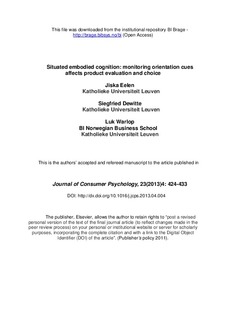Situated embodied cognition: monitoring orientation cues affects product evaluation and choice
Journal article, Peer reviewed
Permanent lenke
http://hdl.handle.net/11250/93792Utgivelsesdato
2013Metadata
Vis full innførselSamlinger
- Scientific articles [2181]
Originalversjon
10.1016/j.jcps.2013.04.004Sammendrag
Consumers generally prefer products that are easy to interact with. In three studies, we show that this preference arises from the fit between product orientation and monitored situational constraints. Flexible right-handers, who monitor situational constraints, recall product orientations better and prefer products for which the handle is oriented in the direction of the hand used for grasping. When their ability to monitor situational constraints is impaired, the preference for easy-to-grasp products is attenuated. The findings highlight that motor fluency is a relevant cue for decision making when consumers assess how to interact with a product. The implications of these results for embodiment and fluency research are discussed.
Beskrivelse
This is the authors’ accepted and refereed manuscript to the article
